Ancient folklore suggests that farming is intrinsically linked to the moon’s phases; that the lunar calendar holds guiding principles about when to sow and harvest. Though you’d be hard pressed to find a farmer willing to bet their crop on the waxing of a moon these days, it feels a fitting prelude to my stay at Fowlescombe Farm that on a late September evening, my drive down is bathed in the sky-tinting scarlet of a blood moon in total eclipse.
The clouds are few and far between, and I have my foot down on a journey I’ve spent more than two decades doing. I’ve split my time between Devon and London for as long as I can remember, with my grandma’s coastal base a constant escape throughout my childhood. But today, I’m bypassing her cottage for this back-to-nature retreat in the heart of Devon’s South Hams.
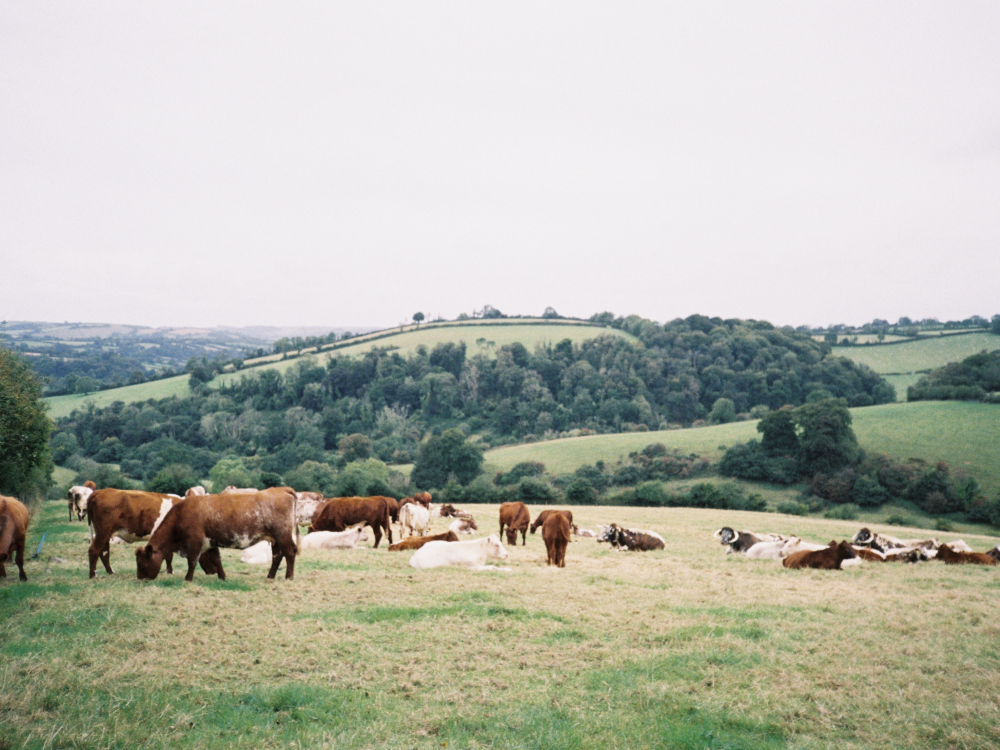
Fowlescombe Farm only opened to guests in May this year, but its name has already earned a lofty reputation — in large part thanks to its tender and immersive approach to sustainable tourism. The patchwork of land that this estate is comprised of (a 450-acre expanse) has been a working farm since the 16th century. Caitlin Owens, daughter of the duo who took over the farm in 2019, tells me that the land ‘lends itself to a particularly fertile bed’, before explaining that Dartmoor’s undulating valleys, milder temperatures and fewer frosts allow for year-round grazing. For more than 10 years, her family has painstakingly invested their love for the Earth into Fowlescombe’s (often literal) roots, and have amplified its established organic operations to make it the regenerative farm it is today. Now Caitlin, along with her partner Paul Glade, is the brains behind its accompanying hotel.
‘I’ve grown up here. Those dog-eared books, puzzles and Scrabble boards in the living areas, they’re from my childhood room,’ she reminisces, after I’m welcomed behind the scenes of this, her passion project, for the next couple of days.
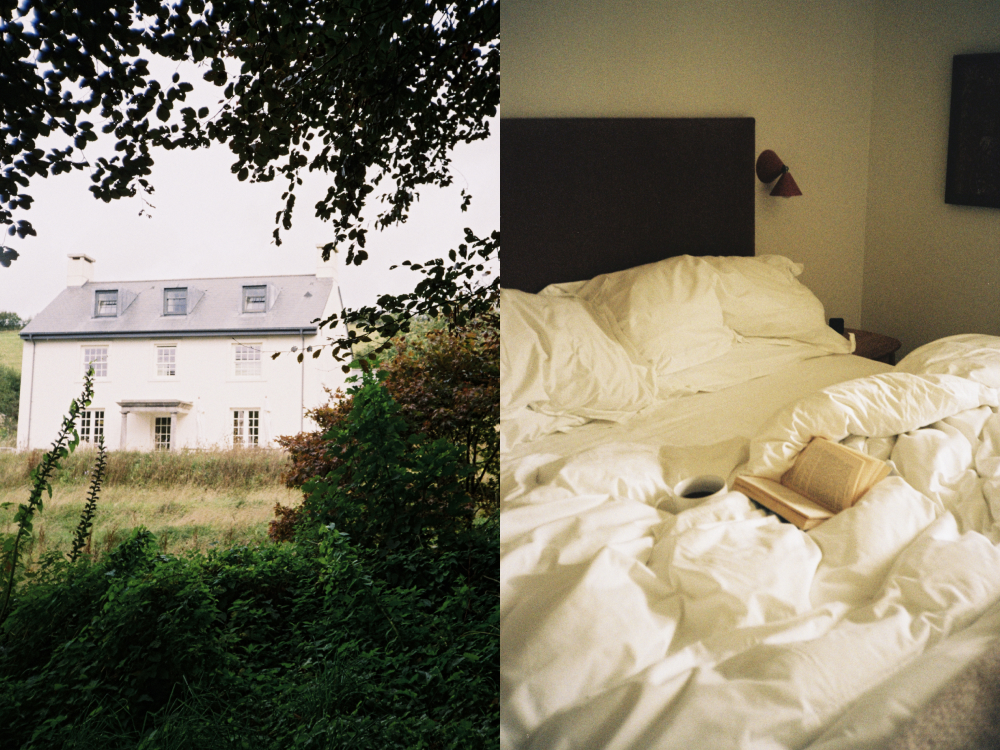
The 10 serene, contemporary rooms and suites are set across a trio of buildings: the old farmhouse (now the retreat’s most impressive room, the Long Barn), and two newer structures. During renovations, the exteriors of all three were strengthened with a stone-like shillet (shale), collected from the on-site quarry and stone carefully extracted from the land’s original 20th-century mansion — now a ruin choked by ivy.
It’s apparent that Caitlin’s love for the land extends far beyond the roaming cattle; it sits at the very core of the comfortability that Fowlescombe works to achieve. That includes its nature-led design, which was conceived by Paul with interiors expert, Sophia Gomm. Inside, colour palettes echo the valley’s rich hues and walls are adorned with paintings from dozens of southwest England’s homegrown talents. Even the farm animals’ coats are utilised in the design, with upholstered furnishings and mattress fillings made from Fowlescombe’s very own sheep’s wool. They’re a special breed: Manx Loaghtan’s were once at risk of extinction, now they’re living happily on this farm as one of the largest flocks in the country.
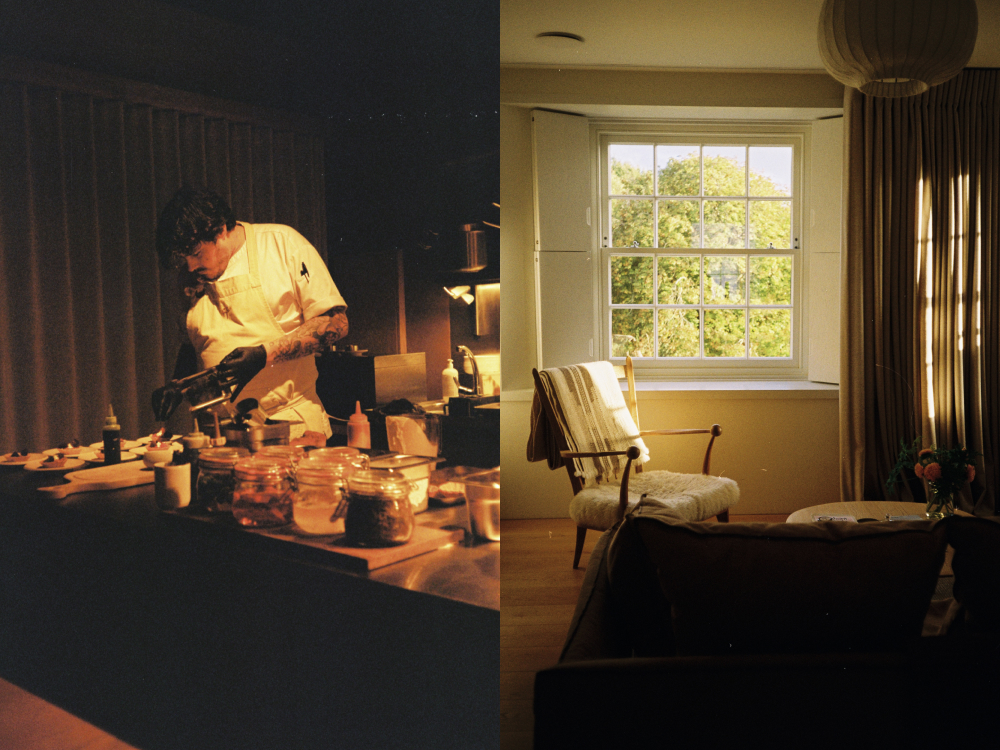
Though they reside in multitudes here, I’ve no need to count sheep that evening as I drift off quickly in my butter-soft bed. The next morning, well-rested, fuelled by the eggs at breakfast — fresh from the hens that speckle my room’s arcadian view — and protected from the wilds by my borrowed raincoat, I head to meet these storied sheep with one of Fowlescombe’s friendly farmers, George. As the sun ascends, I spend some time really getting to know him and the land he so lovingly tends to. We amble through fields as he tells me about his own experience growing up on the farm, the fundamental link between conservation and farming in the UK due to the country’s high agricultural coverage, and the importance of regenerative practices (like rotational grazing and pasture-only feeding) to encourage biodiversity, healthy soil and animal welfare.
As we enter another of the many fields, that animal-first ethos that’s ever present can be seen in the galloping approach of the farm’s Boer goats and the squeals of some new arrivals: litters of palm-sized Tamworth piglets and their resting mamas. ‘Put your hand out, they might come over for a cuddle,’ George says as he hops into their pen and is welcomed like one of their own. A few brave piglets make their way over tentatively, before my dachshund Rue’s inquisition sends them scurrying away.
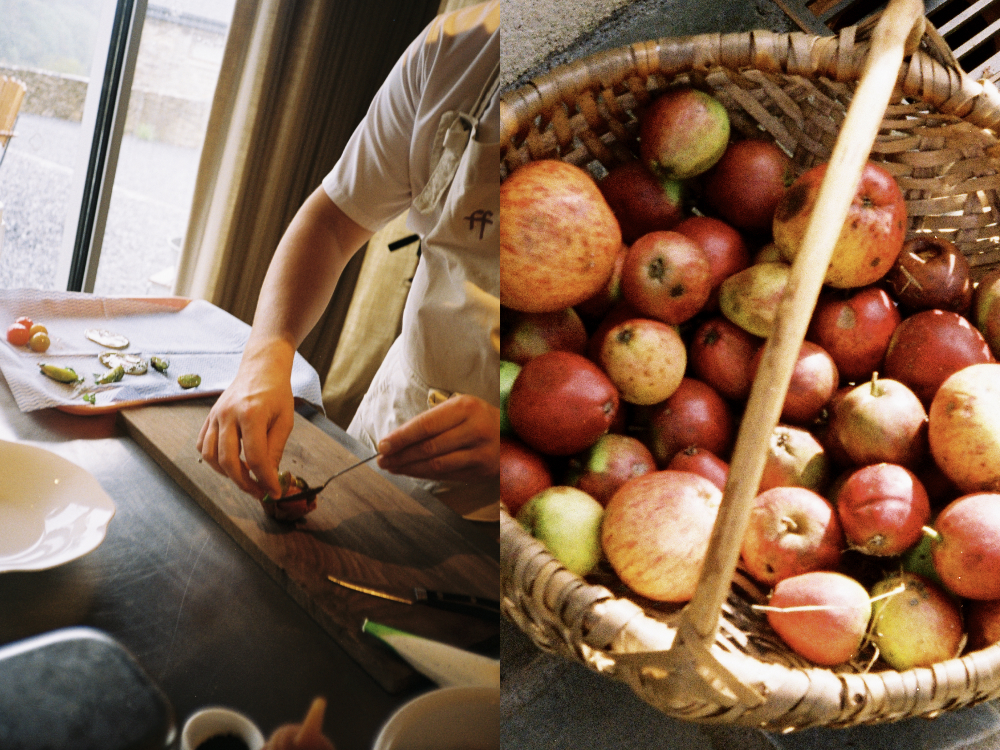
George’s encouragement to engage with the animals is at the heart of Fowlescombe’s ethos. And though resting takes pride of place, you’re also welcome to chip in with the day-to-day running of the farm. Whether that’s something as simple as a tour or a more involved activity (feeding the pigs, collecting the chickens’ eggs or picking fruit) is entirely up to you, but any contribution goes a long way in understanding the green-minded work that keeps the land running.
After we’ve passed the herds of English Longhorn and Beef Shorthorn cattle and fed a few more imploring goats, I head back towards the hotel to meet with head gardener Shelley and her adoring black Lab, Basil. With our dogs playing peacefully behind us, she explains how the garden abides by the same cyclical process as the farm. ‘As soon as a gap appears, we fill it. We put a bit of homemade compost on, put a crop in, and then once it comes up, we harvest and go again… We’re making the land work hard, but we’re also putting a lot back into it,’ she tells me, with a passion as infectious as that of George and Caitlin. She talks me through her crops, explaining how the natural pollinators work and what she’s hoping to plant for autumn, before we bump into Brandon Head — Fowlescombe’s senior sous chef — in search of his daily batch of runner beans and tomatoes. As Shelley meticulously makes her selection, she mentions that they’ll be ‘picking tomatoes for another three or four weeks, before putting in a winter kale or lettuce’.
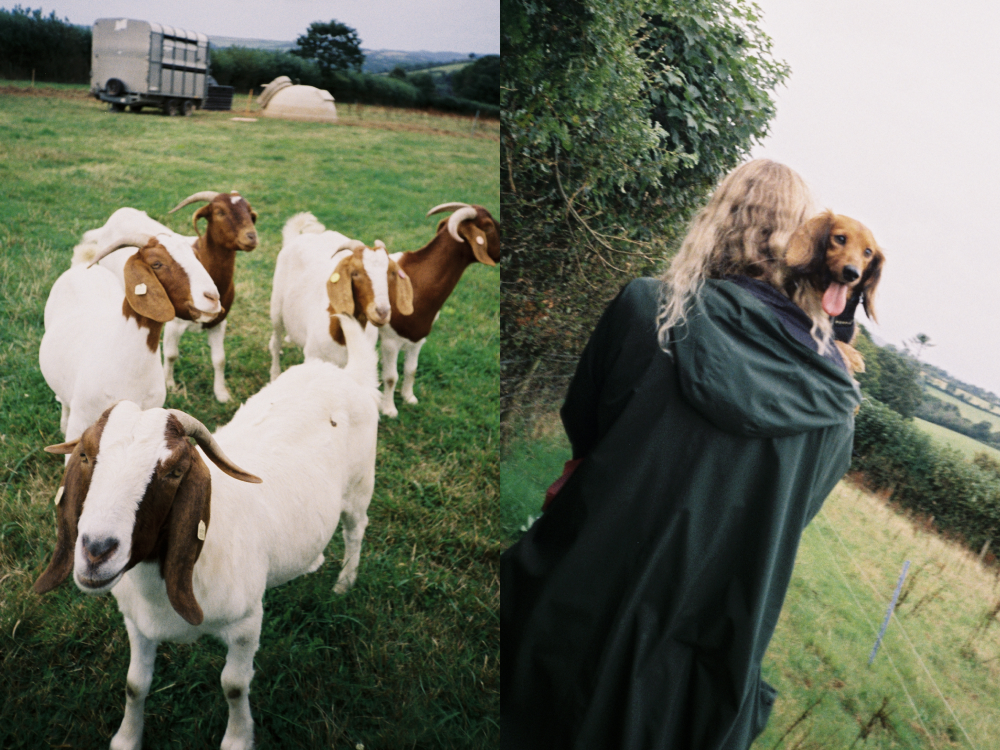
That evening, as I settle down for a dinner where this crop is the star, I quietly acknowledge my gratitude for making it here before the end of the season. All meals are served at The Refectory, an intimate space helmed by an open kitchen that watches over a communal table — should you fancy sharing stories with fellow diners — and a handful of two- or four-seaters. Tonight, I’ve secured a coveted seat close to the action, watching intensely as Brandon peels off the outer layers of tomatoes for a ‘sweeter finish’ and delicately adapts them into many flavourful forms.
A couple of minutes later, the basil-infused tomato purée I’ve just seen him pipe onto plates appears in front of me beside a pair of perfectly seared scallops. ‘They’re caught in one breath, by the country’s only freediving harvesters.’ Brandon tells me, as I realise they’re the only thing on this evening’s menu not grown or produced on-site. The preceding charcuterie plate and marrow velouté is a deft collaboration between George and Shelley, the sirloin that follows is a jus-covered cut from the free-roaming Shorthorn cattle, and the pumpkin tart to finish is accompanied with a deserving bow from that night’s leading man.
The next morning, as I’m watching over the apple orchards from my room, I recall the lunar display that had coloured my journey here just a couple of days earlier. Farming has evolved beyond its reliance on the celestial, but it continues to work in unwavering tandem with the Earth’s natural rhythm. And at Fowlescombe Farm, the ability to tend to both the land and the guests in peaceful harmony stands out as a spectacle almost as rare as the blood-moon eclipse itself.
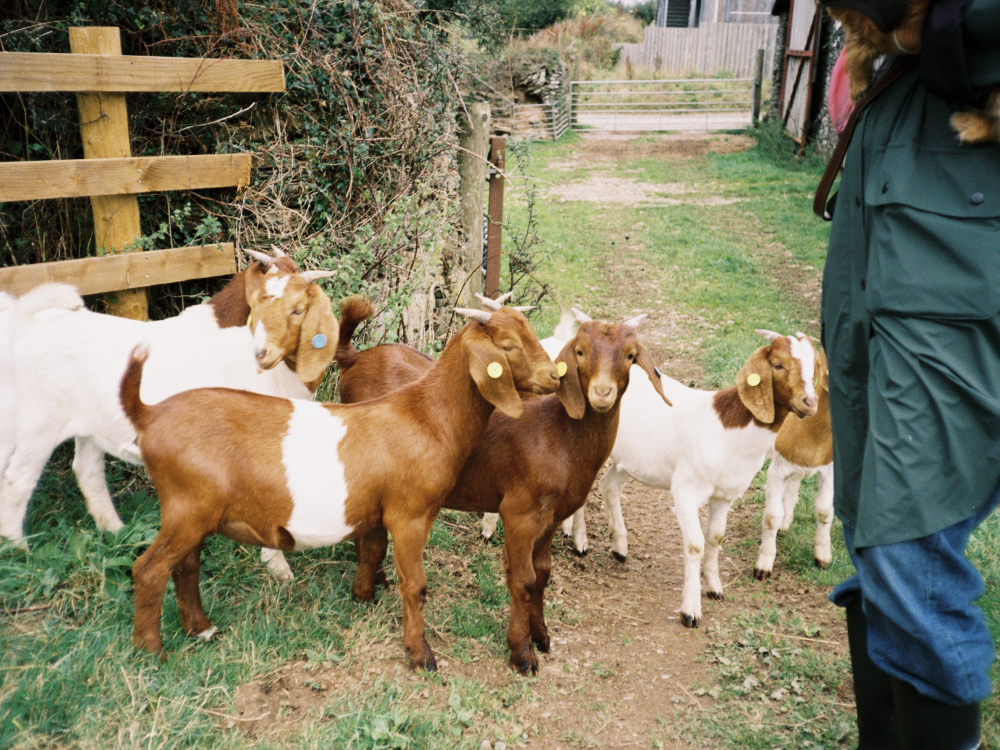
For more Earth-kind inspiration, read our Revival Story on regenerative winemaking at Tillingham and see our full collection of sustainable stays



